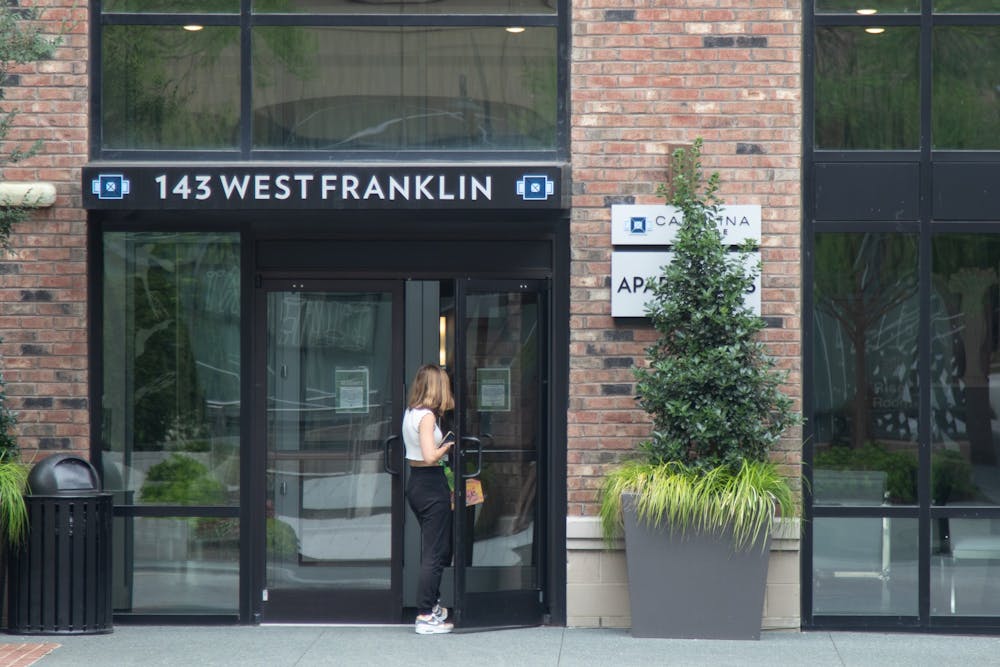Like Jaeger, sophomore Simon Palmore decided to move from his dorm, Alderman Residence Hall, to off-campus housing. Palmore said he agreed with the University’s decision to go remote, but not the lead-up to that decision.
“We spent the whole summer hearing all sorts of really optimistic and rose-colored opinions from University administrators, and they made it sound like the plans that they had made would hold even with some cases,” he said.
Palmore said although he is privileged to have the financial resources to adapt to the University’s decision, it has taken a toll on his mental health.
“It is simply hard to do schoolwork when you are unsure about where you’ll be living next week,” he said.
Brianna Brooks, a junior and a resident adviser in Morrison Residence Hall, used Apartments.com to find a one-bedroom apartment at Trinity at the Hill in Carrboro. She said the University’s handling of the pandemic pushed her to move off campus.
Brooks noted that tuition payments were due about an hour after the University’s announcement. She said she had a feeling Morrison would develop a cluster after other suite-style residence halls did, and she was right.
“For students who work for the University, it’s kind of like a slap in the face,” she said. “We feel like we aren’t being protected and our health isn’t really a concern.”
Remote classes 'not a valid reason' to break a lease
Sophomore Kevin Gomez-Gonzalez used the subleasing Facebook group and the UNC subreddit for the opposite purpose: to look for someone to take over his and his roommate’s lease at Union Chapel Hill Apartments.
“What really brought me to wanting to look into a subleasing was because I know so many people need it way more than I do,” he said.
J. Tristan Routh, a staff attorney at Carolina Student Legal Services, said he has had tough conversations with students about lease terminations ever since the University initially went remote this past spring. Routh said most landlords he spoke to in the spring were not letting tenants break their leases, but some were allowing buyouts, in which the tenant pays their landlord an agreed-upon fee to terminate the lease.
“The COVID situation and the University going remote is not a valid reason to break a lease in North Carolina or pretty much anywhere else around the country,” he said.
To get the day's news and headlines in your inbox each morning, sign up for our email newsletters.
Routh said, for students hoping to leave their apartments, the best option is a lease termination, through a buyout or otherwise.
He said the second best option is to find a replacement tenant, by which the original tenant’s name would come off of the lease and the new tenant would go onto the lease.
If that isn’t possible, Routh suggests a sublease, where the original tenant’s name stays on the lease and they essentially become the landlord of the new subtenant, but are still required to pay their rent if the subtenant backs out or breaches their contract.
Schnee said Northwood Ravin has not seen a significant increase in students attempting to get out of their leases. She said that although Northwood Ravin does not allow subleasing, there are options for students attempting to leave their apartments.
For instance, if an entire apartment chooses to leave, residents can turn in their keys and remain responsible for the rent until the apartment is rerented and a new lease is executed, or they can give 60-day notice and pay a termination fee, she said.
Routh said he highly recommends that tenants check if subleasing is allowed in their apartment complexes before proceeding and form subleasing agreements with subtenants.
“It doesn’t confer any additional protections between you and your landlords, but what it does is it puts in place and memorializes the agreement between you and your subtenant,” he said.
Carolina Student Legal Services can read over leases for students to check if they are allowed to sublease and draft subletting forms if their apartment community doesn’t provide them, Routh said. Their office is open for remote appointments Monday to Friday from 9:00 a.m. to 5:00 p.m.
Schnee said she thinks undergraduates are often unaware of flexible lease terms, which allow students to negotiate lease lengths that work better for them, often carrying premium pricing.
“Don’t be afraid to ask for what the lease terms could be, because there are a lot of landlords really truly committed to helping students find the right fit for them right now and realize that that means maybe changing the way things have been done in the past,” Schnee said.
Gomez-Gonzalez said Union does not allow subleasing, but permits lease takeovers with a $350 fee. Because of the uncertainty surrounding next semester, Gomez-Gonzalez said he plans on entering a private agreement with whomever takes over the lease to return it to him in the spring, at which point he would have to pay the fee again.
As of this past Friday, he said he had communicated with 22 people about lease takeovers. He noted that he would prefer to hand over his room to someone who has been displaced because of the University’s decision.
In an email announcing that residents should cancel their contracts, Carolina Housing Executive Director Allan Blattner said he recognizes that the situation was difficult.
"Please know that we are committed to working with you to navigate this situation and will continue to work toward providing the best – and safest – Carolina experience that we can," he said in the email.
Gomez-Gonzalez said UNC-Chapel Hill and UNC System administrators avoided addressing systemic policy failures by emphasizing students’ personal responsibility with their COVID reopening plan.
“If we would’ve just stayed closed, none of this would be necessary,” he said.
@SLesnewski
@DTHCityState | city@dailytarheel.com




